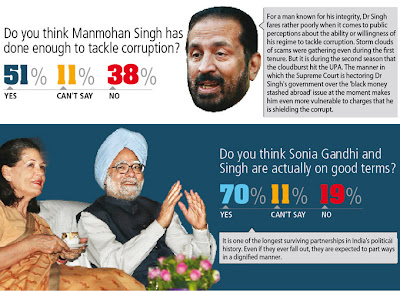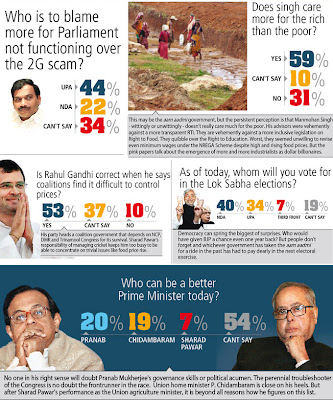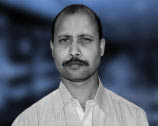Management Guru Arindam Chaudhuri Dean Business School IIPM
Politics cabinet reshuffle: Musical chairs...
The future of a nation is at stake when its political parties fail to reach consensus on issues indefinitely – especially when the government is made up of coalition parties. India has been more than a victim of this. While the Indian National Congress enjoyed undisputed majority when it had clear agendas – gaining Independence, reconstruction of India after Independence, the Nehruvian period – from Indira Gandhi's era, the pace of changes and generations within not only opposing parties but also the electorate ensured that the Congress slowly but surely had to accept the inevitability of ruling (or supporting) through coalitions – an amalgamation of parties that agree on much and disagree on some. The present Congress leadership under UPA-II seem to be thoroughly barbed due to a strange combination of two factors – one, coalition demands; two, opposition logjams. With party and coalition members accused of corruption, and the leadership further accused of deliberating ignoring corruption, the heat has been obviously right at the top for the ruling UPA.
And what's the best method then to ensure a fresh perspective and focus for the government? We have the tried and tested resort of a solution – cabinet reshuffling. Delve deep into the history, and one realizes that cabinet reshuffling exercises have always been more of image cleaning exercises than truly for matching politicians' competencies with respective ministries. And the recent one is no exception. At a time when the image of the UPA-II government has been taking quite too many hits, it has quickly reshuffled the cabinet to clean up its image.
But a quick recap of the entire reshuffling makes no sense – if that was done in order to counter present problems and their solutions. There has been no change in the key ministries including Home, Finance, Defence and External, which have the core party leaders in the leadership. Salman Khursheed (minister for water with additional charge of minority affairs), Jaipal Reddy (petroleum and natural gas minister), Vayalar Ravi (civil aviation ministry) are the gainers who have been promoted at the cabinet level. Among allies, NCP leader Praful Patel got the Heavy Industries and Public Enterprises. M S Gill has been removed from ministry of sports and youth affairs. Ministry of food and public distribution as well as consumer affairs, which were under Sharad Pawar, has now been given to K.V Thomas. And Kapil Sibal retains two important ministries including HRD and Communications and IT.
Ironically, the Congress leadership didn't remove ministers from power for non-performance and irregularities; it only shifted them to other less important ministries. This clearly proves the political back-calculations. Still, if resolving inflation rate was the final objective, then the government should have also ensured that Pranab Mukherjee was shifted to a lesser important ministry. Even that didn't happen for whatever it was worth. Then what exactly did happen? You missed the beginning – image cleaning.
For More IIPM Info, Visit below mentioned IIPM articles.
Arindam Chaudhuri bags Delhi team of i1 Super Series
IIPM ranks No 1 in International Exposure in the 'Third Mail Today B-School Survey'
IIPM Excom Prof Rajita Chaudhuri
IIPM: What is E-PAT?
"Thorns to Competition" amongst the top 10 best sellers of the week.
IIPM RANKED NO.1 in MAIL TODAY B-SCHOOL RANKINGS
IIPM Mumbai Campus
Politics cabinet reshuffle: Musical chairs...
The future of a nation is at stake when its political parties fail to reach consensus on issues indefinitely – especially when the government is made up of coalition parties. India has been more than a victim of this. While the Indian National Congress enjoyed undisputed majority when it had clear agendas – gaining Independence, reconstruction of India after Independence, the Nehruvian period – from Indira Gandhi's era, the pace of changes and generations within not only opposing parties but also the electorate ensured that the Congress slowly but surely had to accept the inevitability of ruling (or supporting) through coalitions – an amalgamation of parties that agree on much and disagree on some. The present Congress leadership under UPA-II seem to be thoroughly barbed due to a strange combination of two factors – one, coalition demands; two, opposition logjams. With party and coalition members accused of corruption, and the leadership further accused of deliberating ignoring corruption, the heat has been obviously right at the top for the ruling UPA.
And what's the best method then to ensure a fresh perspective and focus for the government? We have the tried and tested resort of a solution – cabinet reshuffling. Delve deep into the history, and one realizes that cabinet reshuffling exercises have always been more of image cleaning exercises than truly for matching politicians' competencies with respective ministries. And the recent one is no exception. At a time when the image of the UPA-II government has been taking quite too many hits, it has quickly reshuffled the cabinet to clean up its image.
But a quick recap of the entire reshuffling makes no sense – if that was done in order to counter present problems and their solutions. There has been no change in the key ministries including Home, Finance, Defence and External, which have the core party leaders in the leadership. Salman Khursheed (minister for water with additional charge of minority affairs), Jaipal Reddy (petroleum and natural gas minister), Vayalar Ravi (civil aviation ministry) are the gainers who have been promoted at the cabinet level. Among allies, NCP leader Praful Patel got the Heavy Industries and Public Enterprises. M S Gill has been removed from ministry of sports and youth affairs. Ministry of food and public distribution as well as consumer affairs, which were under Sharad Pawar, has now been given to K.V Thomas. And Kapil Sibal retains two important ministries including HRD and Communications and IT.
Ironically, the Congress leadership didn't remove ministers from power for non-performance and irregularities; it only shifted them to other less important ministries. This clearly proves the political back-calculations. Still, if resolving inflation rate was the final objective, then the government should have also ensured that Pranab Mukherjee was shifted to a lesser important ministry. Even that didn't happen for whatever it was worth. Then what exactly did happen? You missed the beginning – image cleaning.
For More IIPM Info, Visit below mentioned IIPM articles.
Arindam Chaudhuri bags Delhi team of i1 Super Series
IIPM ranks No 1 in International Exposure in the 'Third Mail Today B-School Survey'
IIPM Excom Prof Rajita Chaudhuri
IIPM: What is E-PAT?
"Thorns to Competition" amongst the top 10 best sellers of the week.
IIPM RANKED NO.1 in MAIL TODAY B-SCHOOL RANKINGS
IIPM Mumbai Campus











